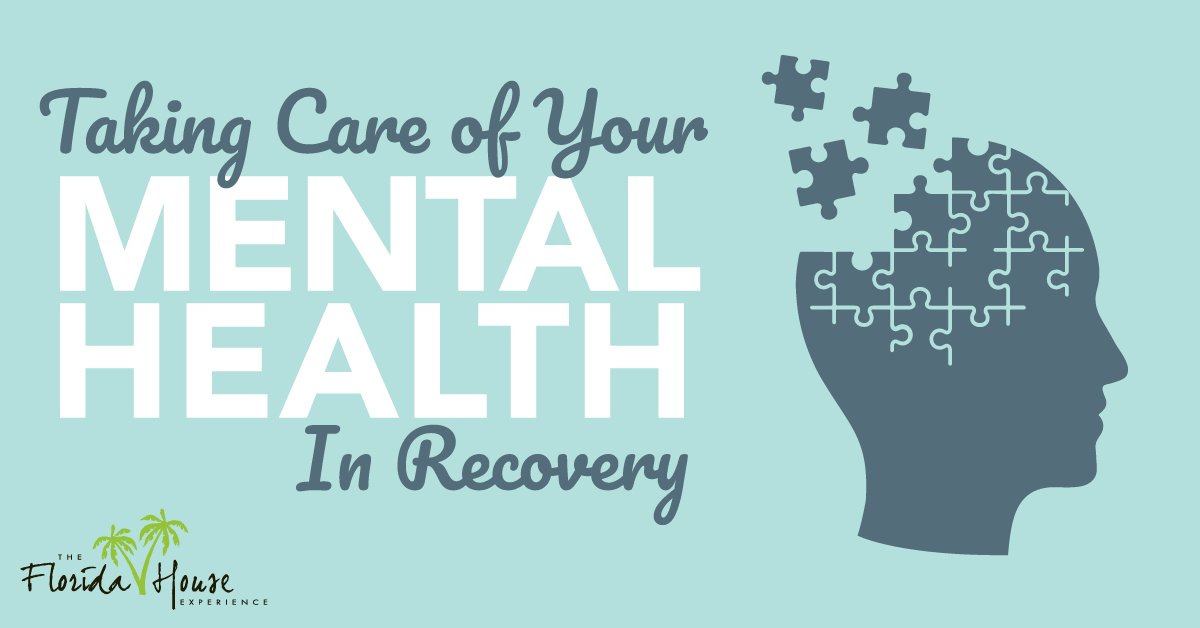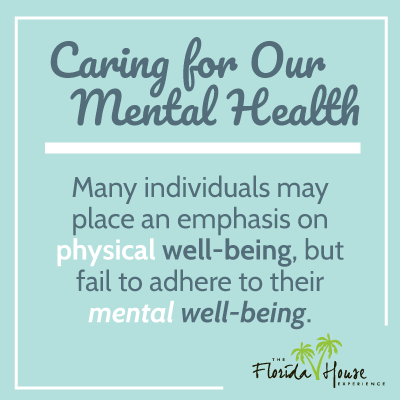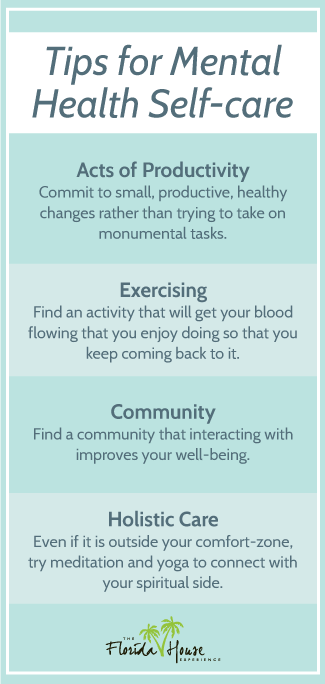
If you are in recovery or know someone in recovery, you are likely aware of the proximity of addiction to mental health issues. Addiction, like mental health, has a long history of being stigmatized. Fortunately, the discussion of hidden mental health disorders has been receiving tremendous attention lately. With such tragedies of Robin Williams, Mac Miller, and other well-known celebrities, mental health along with addiction issues can no longer be ignored. Today, we want to help end the negative stigma by doing the following:
- Defining mental health
- Knowing the signs to look out for
- Providing a few tips for caring for mental health in recovery
We at the FHE Health believe mental health and recovery should not be separated. Let us tell you why.
Defining Mental Health
 Mental health can be defined by the well-being of your thoughts and cognition. This is not something that is simply limited to how well one thinks, their level of knowledge, or if they are able to do math well. It refers to how we think, feel, and act (often socially). Mental health informs our thoughts, which in turn informs our feelings, which then informs how we act and interact with other people and different situations. Thus, mental health is one of the most important facets of being a functioning, working, and social being.
Mental health can be defined by the well-being of your thoughts and cognition. This is not something that is simply limited to how well one thinks, their level of knowledge, or if they are able to do math well. It refers to how we think, feel, and act (often socially). Mental health informs our thoughts, which in turn informs our feelings, which then informs how we act and interact with other people and different situations. Thus, mental health is one of the most important facets of being a functioning, working, and social being.
Many individuals may place an emphasis on physical well-being, but fail to adhere to their mental well-being. In fact, for those striving for a physical well-being, mental health is one of the most important aspects of a physically healthy lifestyle. If you are only focusing on the body, you neglect the mind. Thus, body dysmorphia (the condition in which our brain perceives our bodies as less appealing than they really are), is born. Regardless of how intense a workout it, if you are not caring for the psychological state of your being, you could risk overworking yourself.
While it is necessary to define mental health and why it is important, it is equally important to discuss what mental health is not. Caring for mental health in recovery can sometimes be perceived as laziness. Individuals will perform no actions at all and refer to it as self-care. Some people may take “mental health days” from work, or spend extended periods of time away from people and technology in order to recharge. While taking much-needed rest is important, and everyone is permitted a healthy escape sometimes, productivity is inherently linked to mental health in recovery.
In today’s fast-paced world, there are countless things vying for our attention. Where it is people, work, family, friends, or technology, the list goes on and on. Having downtime with no distractions is something that must be done intentionally. For those with mental health issues, spending time alone in our thoughts can be intimidating, even something actively avoided. Nevertheless, it is vital to incorporate this time into our schedule and deal with the issues that arise. The more we put it off into the future the more the problem will fester and grow.
Poor Mental Health
While we have discussed what mental health is, it is important to talk about what an unhealthy mental state is. If mental health is defined by a state of well being, unhealthy mental states can be defined as the opposite. Constant states of anxiety, depression that seems to never end, panic attacks, and so on are all categories to define an unhealthy mental state. It is important right now, to differentiate people with poor mental health and mental illness. Mental illness is a chronic disease that can be treated, while poor mental health is simply not caring for the state of your mental health. There are chemical imbalances or negative patterns of thinking in the brains of those with mental illnesses, while poor mental health can cause a mental illness, often times it can be prevented or taken care of.
Poor mental health or mental illness can be seen in anxiety. If you or someone you know is exhibiting a constant state of stress, which does not seem to match up with the level in which the stress should affect them, they may be at risk of poor mental health. Another type of poor mental health is depression. Depression is more than simply feeling sad. It is a feeling of constant unwellness. This can be numbness that is constantly existing or the prevalent feeling of depression. It can be seen in a lack of motivation for even the most basic tasks, constantly feeling tired, or not being hungry. A few other symptoms include random panic attacks, a feeling of intense stress in regard to socializing, insomnia, and others.
Tips for Mental Health in Recovery
 A few natural ways to care for your mental health in recovery are as follows. First, little acts of productivity, that eventually give way to a productive lifestyle are very important. Depression can be fought by avoiding that lack of motivation with tasks that might seem very small. Things like making your bed when you wake up, doing laundry, drinking water, or reading a book (self-help books are great). All of these are small simple tasks, that can lead the individual to feel productive and happy. Instead of pressuring yourself to make huge changes in your life all at the same time, it is much more manageable to make small changes over time. Find one area of your life that promotes mental health and start there.
A few natural ways to care for your mental health in recovery are as follows. First, little acts of productivity, that eventually give way to a productive lifestyle are very important. Depression can be fought by avoiding that lack of motivation with tasks that might seem very small. Things like making your bed when you wake up, doing laundry, drinking water, or reading a book (self-help books are great). All of these are small simple tasks, that can lead the individual to feel productive and happy. Instead of pressuring yourself to make huge changes in your life all at the same time, it is much more manageable to make small changes over time. Find one area of your life that promotes mental health and start there.
Exercising and keeping the body healthy is extremely important to mental health. This is not a fitness obsession, but rather, helping the body to produce endorphins that come naturally with exercise. You do not need to go get a gym membership for this. It can be yoga, jogging, kayaking, or biking. Anything that gets your blood pumping. Most importantly, it should be an activity that you enjoy, that you will keep coming back to, and will put a smile on your face.
Finding a community that inspires you and lifts you up is so important. Certainly, other individuals in recovery can help with this, spirituality groups, church friends, or just people that make your mental health better. Find people like this, and do not let them go.
Holistic care is a form of self-care that may be outside of the comfort zone to many individuals. However, it is an often integrated method in recovery, and one many have found great success in. Holistic care means caring for the mind, body, and spirit. Since they all work together, it is important to pay attention to each aspect in order to position yourself for a successful long-term recovery. Engaging in a meditation practice, being aware of the self and the moment, journaling, or taking nature baths care for our deepest self. This is beyond simple cognition or bodily functions, but who we are. Meditation does not need to be intimidating. It can be as simple as a few minutes with your eyes shut, reflecting on things in your life that you are thankful for.
Getting Help
Are you struggling with mental illness, an addiction, or some combination of the two? We at FHE acknowledge the fact that addiction and mental health go hand in hand. Thus, treating both is extremely important. We care about you and want you to be at a location that is best for you. Along with this, if you have any questions or need to reach out to us for any reason, we have a 24-hour contact number, (833) 596-3502. Here was want to help you become a more full person, please do not hesitate to get help for yourself or a loved one today.






